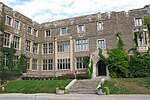McMaster Institute of Environment and Health
Canada university stubsMcMaster University
The McMaster Institute of Environment and Health (MIEH), established in 1996, is a special program at McMaster University. The goal of MIEH is to facilitate, promote, and publish environmental health research. Research and study the complex relationships between the environment and human health.[1]
Excerpt from the Wikipedia article McMaster Institute of Environment and Health (License: CC BY-SA 3.0, Authors).McMaster Institute of Environment and Health
Main Street West, Hamilton
Geographical coordinates (GPS) Address Phone number Website Nearby Places Show on map
Geographical coordinates (GPS)
| Latitude | Longitude |
|---|---|
| N 43.26187 ° | E -79.92027 ° |
Address
McMaster University
Main Street West 1280
L8S 3L8 Hamilton
Ontario, Canada
Open on Google Maps


